Holistic therapies can enhance the management of rare health issues by prioritizing individual well-being. This article explores various modalities like acupuncture and herbal medicine, highlighting their efficacy in symptom relief. It also examines the integration of mindfulness practices and personalized treatment plans. Additionally, we address the cultural perceptions and challenges faced in adopting holistic approaches within mainstream healthcare.
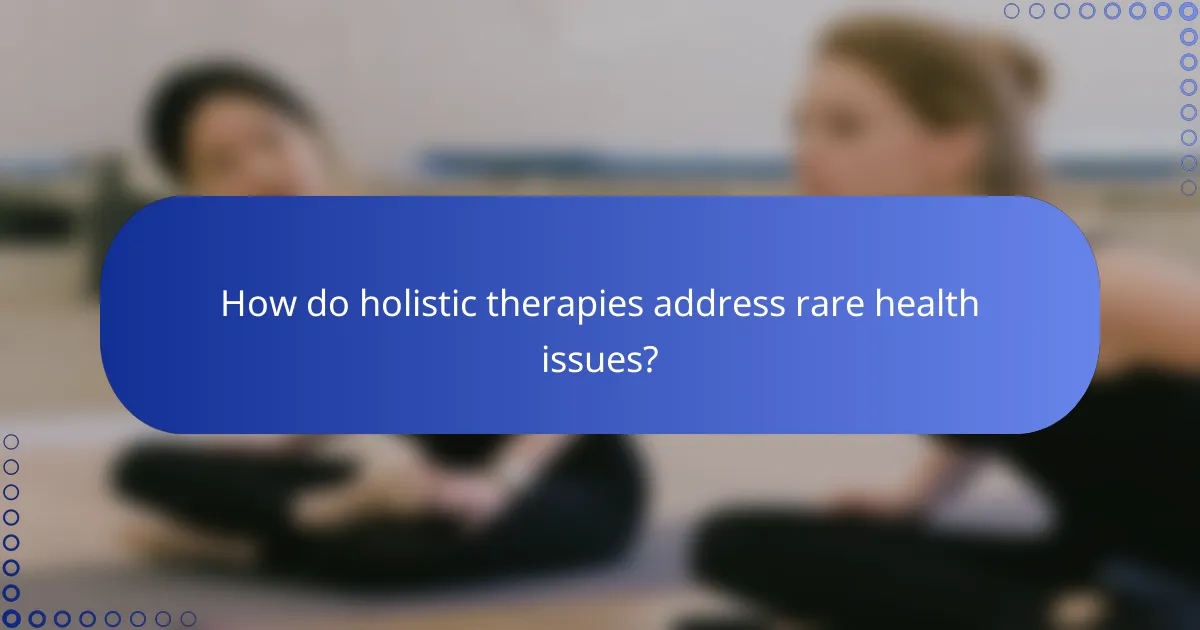
How do holistic therapies address rare health issues?
Holistic therapies can effectively address rare health issues by focusing on the individual’s overall well-being. These therapies often integrate various modalities, including acupuncture, herbal medicine, and mindfulness practices, to create personalized treatment plans.
For instance, acupuncture has shown promise in alleviating symptoms of rare conditions like complex regional pain syndrome. Herbal remedies can support immune function and promote healing in conditions with limited medical options. Mindfulness practices enhance mental resilience, which can be crucial for managing chronic rare diseases.
Research indicates that patients utilizing holistic approaches report improved quality of life and symptom management. This comprehensive focus on body, mind, and spirit helps uncover unique attributes of individual health challenges, leading to tailored interventions.
What are the most common holistic therapies used in treatment?
Common holistic therapies include acupuncture, herbal medicine, yoga, and meditation. These approaches aim to treat the whole person, addressing physical, emotional, and spiritual health.
Acupuncture involves inserting needles into specific points to relieve pain and improve overall wellness. Herbal medicine uses plant-based remedies to support health and manage symptoms.
Yoga combines physical postures, breathing exercises, and meditation to enhance mental and physical well-being. Meditation promotes relaxation and mindfulness, reducing stress and improving emotional health.
These therapies are increasingly recognized for their efficacy in managing rare health issues by fostering balance and supporting the body’s natural healing processes.
How do holistic therapies differ from conventional treatments?
Holistic therapies focus on treating the whole person, while conventional treatments often address specific symptoms. Holistic approaches consider emotional, physical, and spiritual well-being, aiming for overall balance. This can lead to improved quality of life, particularly for rare health issues where conventional methods may fall short. For instance, holistic therapies like acupuncture or herbal medicine may provide relief when traditional treatments are ineffective.
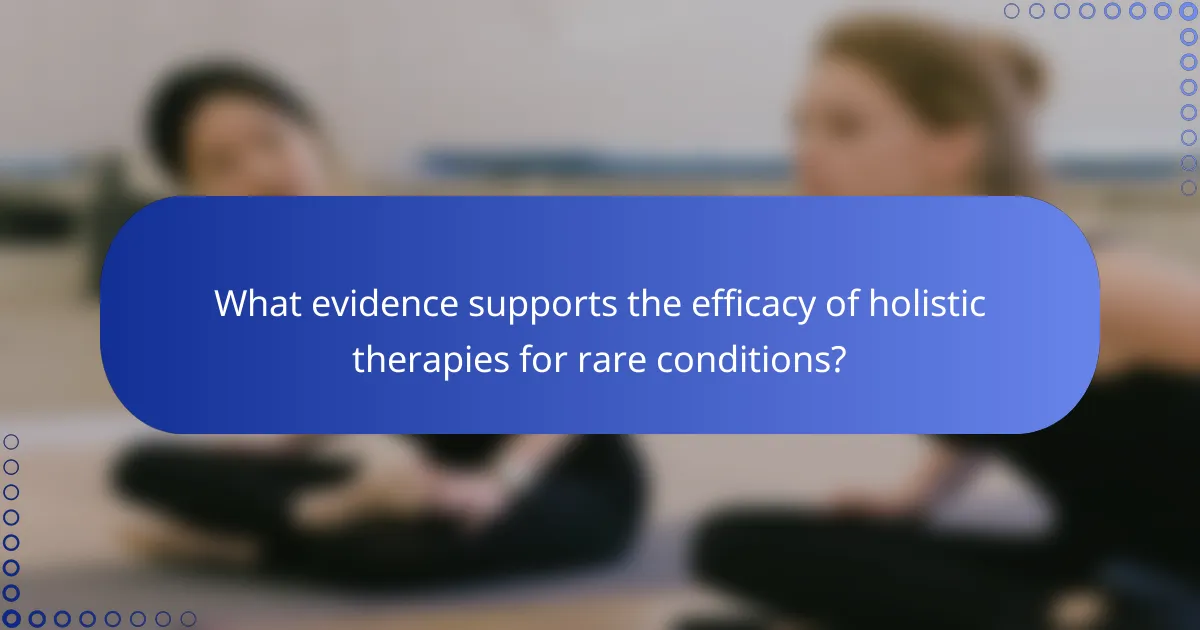
What evidence supports the efficacy of holistic therapies for rare conditions?
Holistic therapies show promise in treating rare health issues, supported by various studies. Evidence includes case reports and clinical trials indicating benefits in symptom management and quality of life. For example, acupuncture has demonstrated efficacy in alleviating pain and improving function in patients with rare chronic conditions. Additionally, integrative approaches combining nutrition, mindfulness, and physical therapies have led to positive patient outcomes. These findings suggest that holistic therapies can complement conventional treatments for rare conditions, enhancing overall patient care.
Which studies highlight successful outcomes of holistic approaches?
Numerous studies demonstrate the successful outcomes of holistic approaches in treating rare health issues. For instance, a study published in the Journal of Alternative and Complementary Medicine found that integrating acupuncture with conventional treatments improved pain management in patients with rare chronic conditions. Another research highlighted the efficacy of mindfulness-based stress reduction in enhancing the quality of life for individuals facing rare autoimmune disorders. Additionally, a meta-analysis indicated that herbal therapies showed significant benefits in symptom relief for patients with uncommon gastrointestinal diseases. These studies collectively underscore the potential of holistic therapies in addressing complex health challenges.
What are the key metrics for measuring efficacy in holistic therapies?
Key metrics for measuring efficacy in holistic therapies include patient-reported outcomes, symptom relief duration, quality of life improvements, and treatment adherence rates. These metrics provide insight into the effectiveness of holistic approaches in addressing rare health issues. For example, tracking symptom relief duration helps evaluate the immediate impact of therapies, while quality of life improvements assess long-term benefits. Additionally, patient-reported outcomes capture individual experiences, offering a unique perspective on therapy efficacy.

What unique attributes do holistic therapies offer for specific rare health issues?
Holistic therapies offer unique attributes for specific rare health issues, emphasizing individualized treatment and integration of mind, body, and spirit. These therapies often utilize natural remedies, such as herbal medicine and acupuncture, which can provide relief where conventional treatments fall short.
For instance, in treating rare autoimmune disorders, holistic approaches like dietary adjustments and stress management techniques can enhance overall wellness and reduce flare-ups. Additionally, therapies such as aromatherapy and energy healing can address emotional and psychological aspects, contributing to a more comprehensive healing process.
These unique attributes distinguish holistic therapies, making them valuable for individuals facing rare health challenges. They promote a personalized healing journey, focusing on the root causes rather than merely alleviating symptoms.
How can personalized treatment plans enhance effectiveness?
Personalized treatment plans significantly enhance the effectiveness of holistic therapies for rare health issues. Tailoring therapies to individual needs improves outcomes by addressing unique health conditions and personal preferences. This approach considers root attributes like patient history and lifestyle, ensuring therapies are relevant and impactful. As a result, patients experience better adherence and satisfaction, leading to improved health metrics. Personalized plans also allow practitioners to monitor progress and adjust treatments, optimizing efficacy over time.
Which holistic practices are particularly effective for specific conditions?
Holistic practices can effectively address specific health conditions through tailored therapies. For instance, acupuncture often alleviates chronic pain, while mindfulness meditation can reduce anxiety symptoms. Herbal remedies, such as turmeric, may support inflammation reduction in arthritis. Additionally, yoga enhances flexibility and stress relief for various ailments. Each practice targets unique attributes of health conditions, offering personalized benefits.
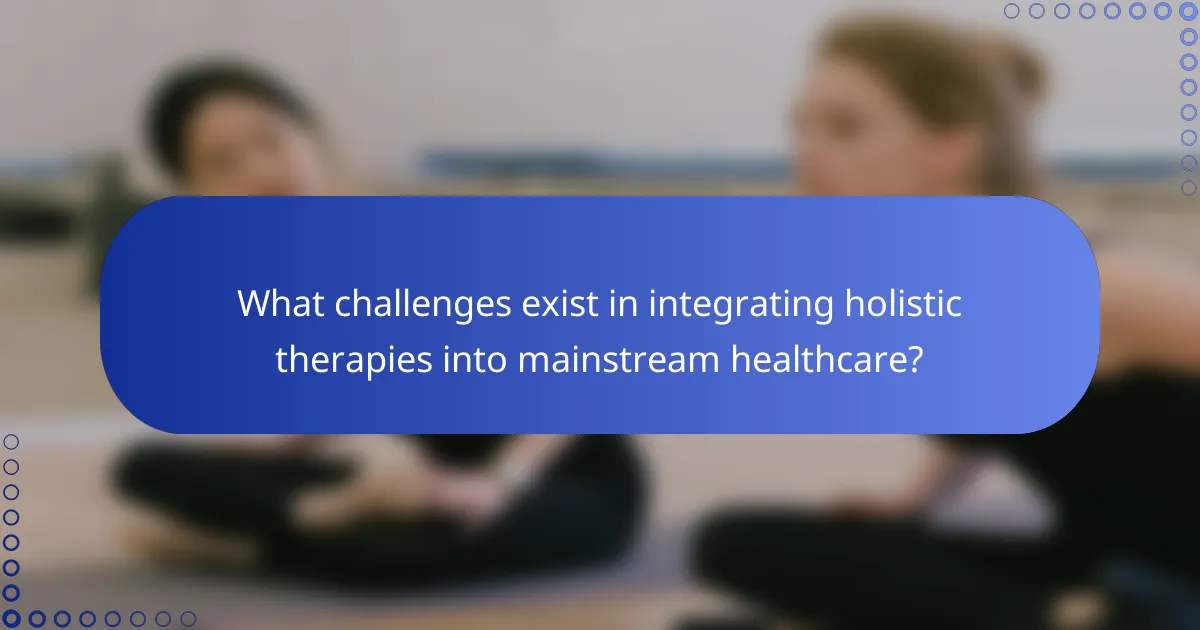
What challenges exist in integrating holistic therapies into mainstream healthcare?
Integrating holistic therapies into mainstream healthcare faces several challenges. These include skepticism from traditional medical professionals, lack of standardized practices, and insufficient research on efficacy. Additionally, insurance coverage for holistic treatments remains limited, which hinders accessibility. The unique attributes of holistic therapies, such as personalized treatment plans, often clash with the standardized protocols of conventional medicine. As a result, patients may struggle to find a balance between holistic and traditional approaches, impacting their overall health outcomes.
How do healthcare professionals perceive holistic therapies?
Healthcare professionals generally view holistic therapies with caution, often recognizing their potential but emphasizing the need for scientific validation. Many practitioners appreciate the patient-centered approach of holistic therapies, which can enhance overall well-being. However, skepticism exists regarding their efficacy in treating rare health issues due to limited empirical evidence. A balanced perspective acknowledges that while holistic therapies may complement conventional treatments, they should not replace evidence-based medical practices.
What barriers do patients face when seeking holistic treatment options?
Patients face several barriers when seeking holistic treatment options, including lack of awareness, limited access, and skepticism from conventional healthcare providers. Many patients are unaware of available holistic therapies that can address their unique health issues. Access to qualified practitioners may be restricted, particularly in rural areas. Additionally, some patients encounter skepticism from healthcare providers who may not recognize the efficacy of holistic treatments. This skepticism can discourage patients from pursuing these options, despite potential benefits.
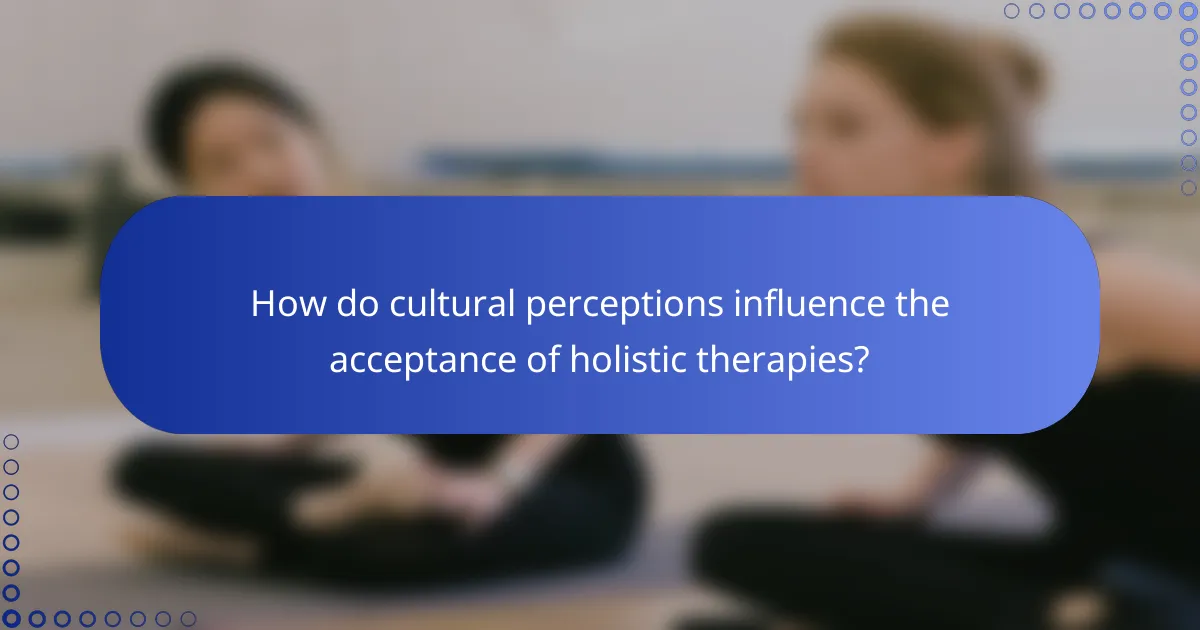
How do cultural perceptions influence the acceptance of holistic therapies?
Cultural perceptions significantly shape the acceptance of holistic therapies. Societal beliefs and values influence how individuals view alternative medicine and its effectiveness.
In cultures that prioritize traditional medicine, holistic therapies may be seen as complementary rather than primary treatment options. For instance, in many Eastern cultures, practices like acupuncture and herbal medicine are widely accepted due to their historical roots. Conversely, in Western cultures, skepticism towards holistic approaches may arise from a focus on evidence-based medicine.
Additionally, the perceived efficacy of holistic therapies can vary widely based on cultural context. Some cultures may emphasize the mind-body connection, leading to greater acceptance of therapies like meditation and yoga. Others may prioritize scientific validation, resulting in resistance to therapies lacking empirical support.
As a result, understanding these cultural dynamics is crucial for promoting holistic therapies effectively. Tailoring approaches to align with cultural values can enhance acceptance and integration into healthcare practices.
What role do regional beliefs play in therapy selection?
Regional beliefs significantly influence therapy selection by shaping perceptions of efficacy and appropriateness. Cultural values often dictate which holistic therapies are favored, impacting patient willingness to engage. For instance, in some cultures, traditional herbal remedies are preferred over modern treatments due to deep-rooted beliefs in their healing properties. This preference can lead to a unique attribute where specific therapies are more accepted in particular regions based on historical efficacy and cultural significance. Understanding these beliefs can enhance the therapeutic relationship and improve treatment outcomes.
How do patient demographics affect therapy outcomes?
Patient demographics significantly influence therapy outcomes by affecting individual responses to holistic treatments. Factors such as age, gender, socioeconomic status, and cultural background can alter the efficacy of therapies for rare health issues. For instance, younger patients may respond more favorably to certain interventions compared to older individuals. Additionally, cultural beliefs can shape perceptions of holistic therapies, impacting adherence and overall success. Understanding these demographic variables allows practitioners to tailor approaches, enhancing treatment effectiveness.
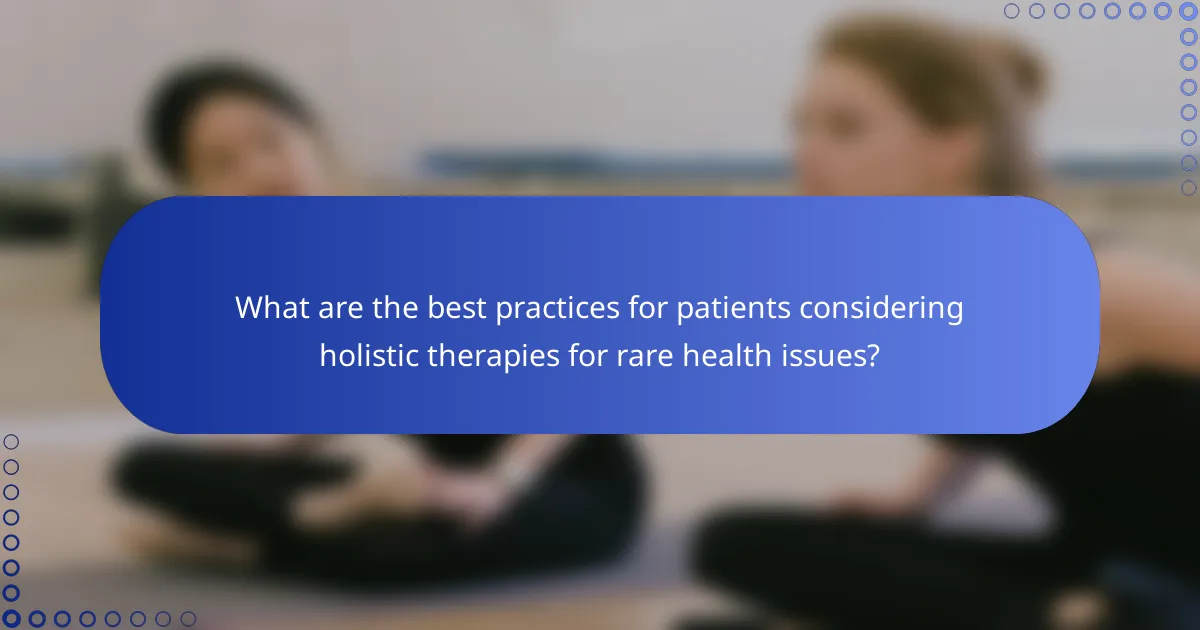
What are the best practices for patients considering holistic therapies for rare health issues?
Patients considering holistic therapies for rare health issues should prioritize informed decision-making and collaboration with healthcare providers. Research evidence supports the efficacy of certain holistic approaches, such as acupuncture and herbal medicine, in managing symptoms.
Engaging with licensed practitioners ensures safety and tailored treatment plans. Patients should also explore peer-reviewed studies to understand potential benefits and risks associated with specific therapies. Additionally, maintaining open communication with conventional healthcare providers fosters an integrated approach to treatment, enhancing overall health outcomes.
When evaluating holistic therapies, patients must consider personal health conditions and any unique attributes of their rare health issues. This personalized assessment is crucial for determining the most effective therapies.
How can patients effectively communicate with healthcare providers about holistic options?
Patients can effectively communicate with healthcare providers about holistic options by being clear and prepared. Start by researching holistic therapies relevant to your health issue. Prepare specific questions about efficacy, safety, and integration with current treatments. Share your health history and express your interest in holistic approaches. This transparency fosters a collaborative relationship, enhancing the potential for tailored care. Engaging in open dialogue about holistic options can lead to more comprehensive treatment plans and better health outcomes.
What common mistakes should patients avoid when exploring holistic treatments?
Patients should avoid common pitfalls like neglecting professional guidance, relying solely on holistic methods, and skipping conventional treatments. These mistakes can hinder recovery and lead to adverse outcomes. Understanding the efficacy of holistic therapies requires a balanced approach that considers both holistic and traditional medical practices. Holistic treatments can complement conventional care but should not replace it without professional advice.
Which resources can patients consult for informed decision-making?
Patients can consult various resources for informed decision-making regarding holistic therapies for rare health issues. Reliable sources include medical professionals, holistic health practitioners, academic journals, patient advocacy groups, and online health platforms. These resources provide insights into the efficacy, safety, and potential benefits of holistic therapies tailored to specific conditions. Engaging with multiple sources ensures a well-rounded understanding of treatment options.